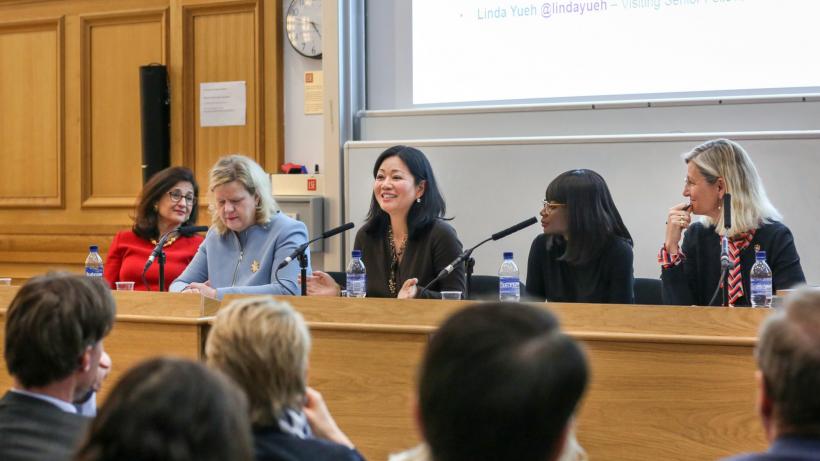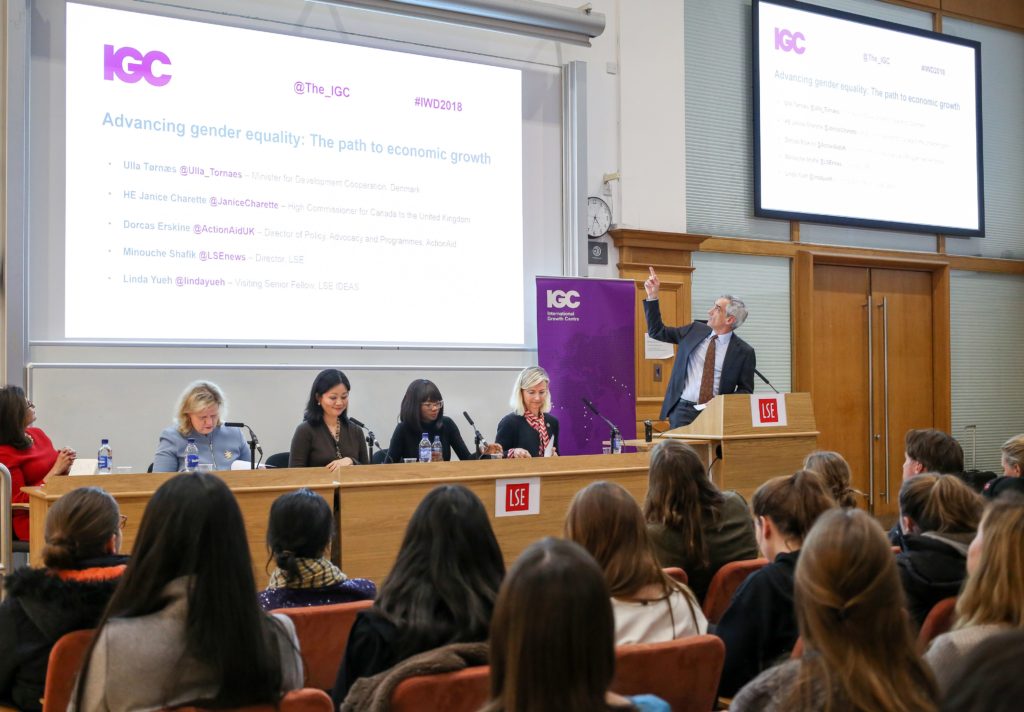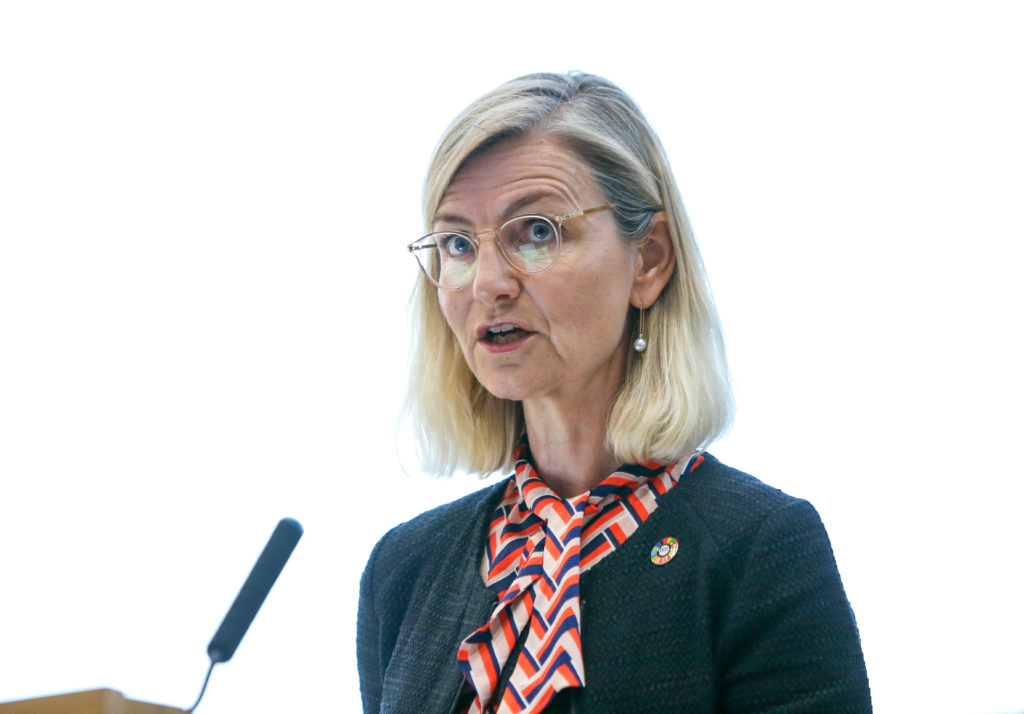
Time is now: Pressing for progress for all women and girls
On International Women’s Day, the IGC hosted a high-level panel discussion on gender inequality and press coverage for girls and women. Laura Sili explores the themes touched upon at this event, and reflects on the global movement towards gender equality the world has witnessed in 2017.
International Women’s Day is a time to reflect on progress made, to call for change and to celebrate acts of courage and determination by girls and women around the world who fight inequality and work towards freedom, prosperity and equal opportunities to achieve their full potential. The feminist movement is now global and gender equality is at the top of the mainstream development agenda – but the gender divide is still growing wider[i].
Women’s participation in the labour market varies greatly across countries, but the use of female labour in developing countries is far from reaching its full economic potential. Apart from having access to fewer employment opportunities, women are also paid less than men. The findings of the Global Gender Report indicate that the average pay for women in 2017 was US $12,000, compared with US $21,000 for men. Although a significant improvement has been recorded in advancing women’s political participation and leadership, the political sphere is largely dominated by men. Women in Politics 2017 shows that, despite representing almost half of the population, only 23.3% of the world’s political leaders are women. Most of the barriers and limitations imposed are due to social norms which relegate women to an inferior place in the society, from where they are able to contribute only marginally to the social development of their countries. In addition, women's rights are subjected to appalling violations and sadly, women and girls around the world are still married as children, or trafficked into forced labour or sex slavery.

IGC’s International Women’s Day event
Ahead of International Women’s Day, IGC convened a high-level discussion exploring what needs to happen to ensure that global leaders, civil society, and the private sector unite forces to eliminate gender inequality and press for progress for all girls and women. Key questions explored by the panellists included:
- What actions are needed to meet the global commitment of achieving gender equality and empowering all women and girls by 2030?
- How are women a driver of global economic growth? and what does it mean to empower women in a context where traditional cultural roles and norms dictate a lack of societal value and rights for women?
- How can we address the biggest challenges that stop women from all around the world from being able to access secure jobs in safe working environments, free from all forms of discrimination and violence?
The themes around women’s economic empowerment continue to surface as key to addressing development challenges, mentioned Jonathan Leape, IGC Executive Director, in the opening remarks. Reflecting on development solutions that can effectively empower women, Leape referred to a seven-year IGC evaluation of a BRAC ‘graduation’ programme in rural Bangladesh, where ultra-poor women received livestock and two years of training to help them work with it. The results indicated that after four years, targeted women shifted to more steady and productive work and increased their annual earnings by 37%. Seven years after the start of the programme, these women and their households continue to escape poverty at a steady rate.
The event, moderated by Linda Yueh, convened four inspirational women leaders from the academic, diplomatic, non-profit and political sector: Ulla Tørnæs, Minister for Development Cooperation in Denmark, Janice Charette, Canadian High Commissioner in the United Kingdom, Minouche Shafik, LSE Director and Dorcas Erskine, Director of Policy, Advocacy and Programmes at ActionAid. The panel underlined the importance of gender issues in approaches to global development. Acknowledging that women’s rights are under increasing pressure, the panellists stressed that by giving women a choice they are empowered to participate in the economy.
If women do not have control of their bodies; if women cannot say no to violence, they will not progress economically. – Dorcas Erskine, Director of Policy, Advocacy and Programmes, ActionAid
When #SheDecides, the world is better, stronger, safer
Dorcas Erskine’s statement reflects the growing global movement that demands that girls and women are given the space to make their own decisions: #SheDecides. This movement has rapidly become the uniting call for leaders to stand up as a matter of urgency to protect the rights, health, safety and livelihoods of millions of girls and women around the world.

Denmark is one of the core pillars of the She Decides movement. In her speech at a high-level event hosted by the IGC, Ulla Tørnæs, Minister for Development Cooperation in Denmark has emphasised the importance of women having control over their reproductive health, which improves the long-term health of mothers and children and creates a lasting economic benefit. IGC evidence from the country with the second youngest population in the world, Uganda, reveals that after two years of providing vocational training and information on sex, reproduction and marriage to adolescent girls, the likelihood that girls engage in income generating activities raises by 72% (mainly driven by increased participation in self-employment), teen pregnancy falls by 26%, and early entry into marriage/cohabitation falls by 58%. Strikingly, the share of girls reporting sex against their will drops from 14% to almost half that level and preferred ages of marriage and childbearing both move forward.
In the first year of the SheDecides movement, 40,000 people and 150 organisations signed up and committed collectively to a vision of a New Normal. Minister Ulla Tørnæs, encapsulated the core of this movement in her statement of women’s rights. She said, “Representatives from governments, parliaments, civil society and academia pledged to stand up for this New Normal. A New Normal where women and girls can decide freely about their own bodies. Their own lives. And their own futures. Where She Decides. Without question”.
Women’s economic empowerment and global growth
Women’s empowerment and economic growth are closely linked. Removing the barriers for women’s equality in the labour force may crucially benefit the health of children and mothers, improve girls’ education, and reduce fertility rates, among other things.
When women’s potential as economic agents is unleashed – women’s rights take leaps ahead and it creates a ripple effect for societies. Women and girls are a strong resource - 51% of the world’s population, whose potential - when activated - can bring a boost to the economy, bring new ideas, variety and new perspectives. – Ulla Tørnæs, Minister for Development Cooperation, Denmark
Unfortunately, women tend to have less access to formal financial institutions and saving mechanisms. While 55% of men report having an account at a formal financial institution, only 47% of women do worldwide ( World Bank Findex, Financial Inclusion Data). This IGC project evaluated the long-term impact of women having greater access to microfinance on their participation in the labour force. The question was examined in the context of urban India, where women are generally unable to take advantage of urban agglomeration and labour market opportunities. Key findings include that access to microfinance integrates women into the labour force and, as a consequence of increasing women’s participation in the labour force, greater access to microfinance reduces fertility rates in the long run.
At a time of unprecedented global movement for women’s rights, equality and justice, let’s join forces to ensure all voices of girls and women around the world are being heard. The time is now to push for gender equality and empower all women and girls!
You can listen to the audio recording of the public event with Minister Tørnæs here.
Editor's Note: This blog post is linked to the LSE Festival: New World (Dis)Orders
References
World Bank Findex, Financial Inclusion Data, accessible at: http://siteresources.worldbank.org/EXTGLOBALFIN/Resources/8519638-1332259343991/world_bank3_Poster.pdf
[1] https://qz.com/1117632/its-going-to-take-217-years-to-close-the-global-economic-gender-gap/


